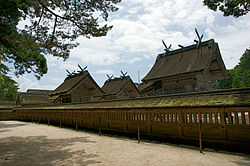Izumo-taisha
| Izumo-taisha 出雲大社 |
|
|---|---|

Monjin-no-yashiro, Amasaki-no-yashiro, Mimukai-no-yashiro, and honden
|
|
| Information | |
| Type |
Chokusaisha Beppyo jinja, Shikinaisya Izumo no Kuni ichinomiya Kanpeitaisha |
| Dedicated to | Ōkuninushi, Kotoamatsukami |
| Reisai |
Reisai (taisairei) (May 14-16th) |
| Honden style | Taisha-zukuri |
| Address | 195 Kitsukihigashi, Taisha-machi, Izumo-shi, Shimane-ken 699-0701 |
| Website | www |
|
|
|
Izumo-taisha (出雲大社 Izumo Grand Shrine?, also Izumo Ōyashiro) is one of the most ancient and important Shinto shrines in Japan. No record gives the date of establishment. Located in Izumo, Shimane Prefecture, it is home to two major festivals. It is dedicated to the god Ōkuninushi (Ōkuninushi-no-mikoto), famous as the Shinto deity of marriage and to Kotoamatsukami, distinguishing heavenly kami. The shrine is believed by many to be the oldest Shinto shrine in Japan, even predating the Ise Grand Shrine.
A style of architecture, taisha-zukuri, takes its name from the main hall of Izumo-taisha. That hall, and the attached buildings, were designated National Treasures of Japan in 1952. According to tradition, the hall was previously much taller than at present. The discovery in the year 2000 of the remains of enormous pillars has lent credence to this.
Several other buildings in the shrine compound are on the list of Important Cultural Properties of Japan.
According to the two oldest chronicles of Japan, the Kojiki and Nihon Shoki, when Ninigi-no-Mikoto, grandson of the Sun Goddess Amaterasu, descended from the heavens, the god Ōkuninushi granted his country to Ninigi-no-Mikoto. Amaterasu was much pleased by this action and she presented Izumo-taisha to Ōkuninushi.
At one time, the Japanese islands were controlled from Izumo, according to Shinto myths. Izumo, known as the realm of gods or the land of myths, is Izumo-taisha's province. Its main structure was originally constructed to glorify the great achievement of Ōkuninushi, considered the creator of Japan. Ōkuninushi was devoted to the building of the nation, in which he shared many joys and sorrows with the ancestors of the land. In addition to being the savior, Ōkuninushi is considered the guardian god and god of happiness, as well as the god who establishes good relationships.
...
Wikipedia
